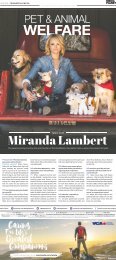Open Banking Concept
You also want an ePaper? Increase the reach of your titles
YUMPU automatically turns print PDFs into web optimized ePapers that Google loves.
Creating an <strong>Open</strong> <strong>Banking</strong> Framework for Canada<br />
How is the system governed?<br />
Who should provide oversight to the <strong>Open</strong><br />
<strong>Banking</strong> system?<br />
The governance responsibilities for an <strong>Open</strong> <strong>Banking</strong><br />
system involve both the definition of the system (e.g.,<br />
developing an accreditation framework) and the ongoing<br />
operational oversight (e.g., acting as a dispute resolution<br />
body for liability issues between data generators,<br />
data recipients, and customers). Specifically, these<br />
responsibilities could include but are not limited to…<br />
Defining the <strong>Open</strong> <strong>Banking</strong> system<br />
..<br />
Developing the data-sharing standards that data<br />
generators must abide by to make customer data<br />
available.<br />
..<br />
Developing the specific accreditation criteria that<br />
governs which data recipients are allowed to request<br />
data from data generators.<br />
..<br />
Define the liability framework that clearly outlines the<br />
roles and responsibilities of data generators, data<br />
recipients, and customers.<br />
Operating the <strong>Open</strong> <strong>Banking</strong> system<br />
..<br />
Providing ongoing oversight over data generators and<br />
accredited data recipients (e.g., regularly auditing data<br />
recipients to ensure accreditation criteria are<br />
being met).<br />
..<br />
Acting as a central dispute resolution body for<br />
customer complaints and liability issues.<br />
..<br />
Support the development and execution of<br />
customer education.<br />
..<br />
Providing a mandatory insurance product (similar to<br />
the CDIC) that pays out in case of disruptive losses<br />
that lead to the complete failure of a data recipient;<br />
this program could be funded by a mandatory fee as<br />
part of the accreditation process.<br />
..<br />
Offering a digital identity, consent, and authentication<br />
management system.<br />
The responsibilities can be either consolidated into a central<br />
governance function, or distributed to data generators,<br />
data recipients, and industry bodies that represent<br />
customers (e.g., the Office of the Privacy Commissioner).<br />
This report does not attempt to outline the ideal allocation<br />
of responsibilities between these various parties. Instead,<br />
we outline several key considerations that demonstrate<br />
how the guiding principles for the <strong>Open</strong> <strong>Banking</strong> framework<br />
as a whole (on page X) could inform the distribution of<br />
responsibilities:<br />
Value focus:<br />
Prevent conflicts of interest that inhibit<br />
the delivery of value to Canadians.<br />
The governance framework should consider the<br />
interests of the parties involved in the oversight of<br />
the system. For example, neither data generators<br />
nor data recipients should have sole control over the<br />
development of an accreditation framework, as it<br />
may lead to an overly complex process (that unduly<br />
limits participation from data recipients) or an overly<br />
open ecosystem (that exposes the financial services<br />
ecosystem to undue risks). Ensuring that the interest<br />
of the customer is represented across governance<br />
functions is critical to developing an <strong>Open</strong> <strong>Banking</strong><br />
system that delivers true value for Canadians.<br />
Safety:<br />
Leverage regulatory authority where needed<br />
to protect the safety and soundness of<br />
the financial system in Canada.<br />
The governance framework should ensure that<br />
Canadians are not exposed to undue risk. For<br />
example, the system should consider where access to<br />
datasets through non-open banking methods should<br />
be permitted for data that is available through <strong>Open</strong><br />
<strong>Banking</strong>. Given the <strong>Open</strong> <strong>Banking</strong> framework should<br />
provide more secure, cost-efficient, reliable, and<br />
customer-friendly access to data, alternatives (such as<br />
screen scraping) may be a source of unnecessary risk<br />
to the system.<br />
..<br />
Manage the recovery of variable costs incurred by data<br />
generators to make data available to third parties.<br />
11.









